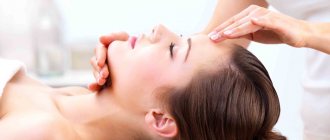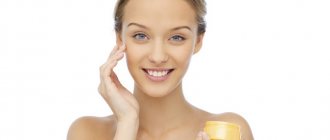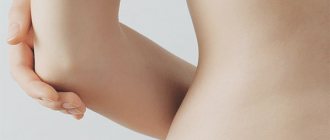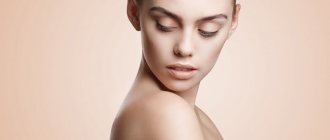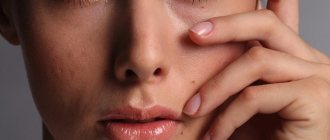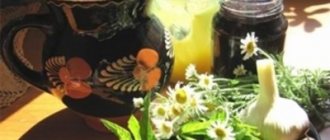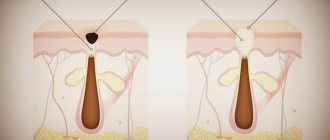Atopic dermatitis is a fairly common problem. This disease is associated with allergic reactions. It is accompanied by a rash, redness of the skin, and the formation of cracks on it. Atopic skin is the result of a sluggish allergic process in the body. It is characterized by increased sensitivity and dryness, which under certain conditions develops into full-fledged dermatitis. Naturally, people with this type of skin should know about the causes of the pathology and how to avoid complications.
Atopic skin: what is it?
To begin with, it is worth understanding the features of the pathology. In fact, there is no such diagnosis as “atopic skin”. In modern medicine they talk about atopic dermatitis. This is an allergic disease that affects the human skin. It is associated with hypersensitivity of the immune system, since an increase in the level of specific immunoglobulin E is observed in the body of patients.
According to statistics, 10-20% of the planet's population is prone to the disease. As a rule, the disease manifests itself in childhood, in the first years of a child’s life. Most often, with proper treatment, the disease goes away as you get older. But there are people who have to deal with this problem throughout their lives. Dryness, increased irritability and sensitivity to physical and chemical influences - all these signs are familiar to those with atopic skin. A similar phenomenon is associated with sluggish allergic and inflammatory processes.
Atopic skin
When an allergist says “atopic skin,” he means that the skin of the person he is currently examining has characteristics that are typically found in patients with allergic skin diseases. Most often this is atopic dermatitis. In such patients, the skin is very dry to the touch, even if the disease is in remission. Often there are areas of thickened, rough skin characteristic of a chronic process (this phenomenon is called lichenification). These changes are observed in typical places: behind the ears, in the neck, elbows, under the knees, on the backs of the hands and feet, and less often in other areas.
With Jobe syndrome, patients will also have very dry, even wrinkled, skin with significantly reduced elasticity. Such skin is also called atopic, although the disease is non-allergic.
Atopic skin requires special care. Since severe dry skin in patients is secondary to moisture loss due to a chronic inflammatory process, such skin requires good hydration. Currently, many different skin care products have been developed, so-called emollients (moisturizers), which do not contain substances traditionally considered drugs.
But nevertheless, they have a fairly good moisturizing effect, and in some cases they even slightly reduce inflammation. Among these products, good effects were observed in the following: Trixera, Topicrem, Exomega, Lipikar, Excipial M and others. The use of such products, and not just baby cream, is an important component in the treatment of atopic skin.
The main causes of the disease
There is a reason why a person has atopic skin. What it is? In this case, changes in the condition of the skin are associated with disturbances in the functioning of the immune system.
As already mentioned, patients usually have some genetic predisposition. Nevertheless, several risk factors can be identified that provoke the development of an allergic reaction:
- Body contact with allergens. In this case, food allergens (in particular, milk, eggs, some fruits, cocoa and other substances that enter the body during food), microorganisms (an allergic reaction can be triggered by the activation of staphylococci, fungal microorganisms), inhalation allergens can act as triggers (animal fur, dust mites, plant pollen).
- Physical influences, in particular, too dry air, sudden and rapid changes in temperature.
- An allergic reaction may be associated with infectious diseases.
- Skin contact with certain chemicals, particularly cosmetics and detergents.
- The functioning of the immune system is closely related to hormonal levels. Therefore, risk factors include severe stress, which is accompanied by sharp fluctuations in hormone levels.
Failure in the immune system
Atopy is a hereditary disease. Genetic predisposition to the disease is passed on from parents. This is expressed by the body’s tendency to various allergic reactions.
If one of the parents has an atopic disease, then the probability of this disease developing in the child is 50%. If both the father and mother have such a disease, then the probability of the disease manifesting in the child is 75-80%. However, in 10% of cases, this disease may occur in children whose parents did not have a predisposition to atopic reactions.
Having such a predisposition, a person is prone to:
- allergic skin diseases;
- the occurrence of asthma;
- diseases of the organs of vision;
- diseases of the digestive system.
Atopic skin: what is it? Photos and main symptoms
The sooner the patient receives treatment, the less likely it is to develop complications. So what changes characterize atopic skin? Signs may vary.
Redness appears on the body. The skin in the affected areas becomes dry and very sensitive - often touching or moving causes pain to the person. As the disease progresses, the epidermis begins to peel off greatly. Another symptom is itching in the affected areas, and due to scratching, abrasions, scratches and even cracks often occur on the skin. Due to wounds on the skin, atopic dermatitis is often complicated by bacterial or fungal diseases.
Of course, such signs are observed only during exacerbations. The rest of the time, atopic skin is simply too dry and sensitive, and it is not possible to get rid of dryness with regular moisturizers.
In addition, patients with similar features suffer from cracking of the skin on the feet and increased sweating. You can often observe the formation of dark circles under the eyes, scaly papules on the wings of the nose, as well as thinning and weakening of hair.
Symptoms of atopic dermatitis
People who suffer from atopic dermatitis, when developing, pathologists may find:
- thickening of atopic skin;
- cracks. They occur especially often on the soles and palms;
- hyperpigmentation of the eyelids. The usual shade of the eyelids changes to a darker one;
- symptom of “winter foot” - it is expressed in hyperemia, as well as moderate infiltration of the sole, the development of peeling processes and the formation of cracks;
- Morgan's symptom - the appearance of deep wrinkles on the lower eyelids;
- symptom of “polished nails” - longitudinal striations on the nail plates disappear. Due to constant scratching of the skin, nails lose their characteristic appearance;
- symptom of a “fur hat” - the appearance of hair dystrophy in the occipital region;
- Pseudo Hertog's symptom - hair temporarily disappears. First on the outer third, and then on separate sections of the eyebrows.
Diagnostic measures
Atopic skin is a serious problem, but you shouldn’t try to diagnose it yourself. Leave it to the dermatologists. As a rule, a visual examination by a specialist is enough to suspect that the patient has a tendency to dermatitis. In the future, other tests are carried out, in particular a blood test for the level of immunoglobulins and eosinophils (their number increases greatly during an allergic reaction).
There is another way to determine whether a patient has atopic skin. What it is? Skin testing is an important diagnostic measure. During the procedure, groups of specific allergens are applied to the patient's skin, after which the body's reaction to these substances is checked. Thus, the doctor has the opportunity to determine which factors the patient should avoid. For example, some people are advised to exclude certain foods from their diet, while others are advised not to keep pets.
Failure in the immune system
Atopy is a hereditary disease. Genetic predisposition to the disease is passed on from parents. This is expressed by the body’s tendency to various allergic reactions.
If one of the parents has an atopic disease, then the probability of this disease developing in the child is 50%. If both the father and mother have such a disease, then the probability of the disease manifesting in the child is 75-80%. However, in 10% of cases, this disease may occur in children whose parents did not have a predisposition to atopic reactions.
Treatment at the acute stage
What to do if you have atopic skin? How to treat the disease? In fact, drug therapy is only needed at the acute stage.
As a rule, to begin with, patients are prescribed antihistamines (Tavegil and others), which eliminate swelling, dilate subcutaneous capillaries, and block the development of an allergic reaction. Antibacterial drugs are necessary if a secondary infection is suspected. In order to restore normal intestinal microflora and improve the functioning of the immune system, doctors prescribe probiotics. Steroid drugs have a more pronounced effect - they almost instantly stop allergic and inflammatory processes, but such drugs are prescribed only in the most severe cases.
Treatment of atopic dermatitis
It should immediately be noted that treatment of this disease should only be prescribed by a specialist . Drugs that will be included in the complex of therapy for atopic skin should be prescribed after the diagnosis has been established. If you find yourself with symptoms characteristic of this disease, then you should not self-treat this disease.
You should know that several diseases can have similar symptoms. If you carry out treatment at home, choosing medications yourself, then you will only worsen your health condition and put your own life at risk. The risk of this is especially high if atopic dermatitis occurs in a child. Under no circumstances should the duration of the course prescribed by a specialist be extended independently.
Even if the medications are effective and allow you to eliminate the symptoms of atopic skin, there is no need to prolong them without consulting a doctor. Even if you use creams or drugs that, in your opinion, are not capable of causing any harm to your health, you should not forget about the side effects that each drug has. They may occur to you if you deviate from the treatment strategy chosen by your doctor.
Treatment of exacerbation of atopic dermatitis
During the course of atopic dermatitis, moments of exacerbation of the disease periodically occur. In this case, treatment should be carried out comprehensively using a whole range of drugs:
- Topical glucocorticosteroids. This group of drugs is used quite often in the treatment of this skin disease. All products are united by the fact that they are intended for external use, and are used mainly to eliminate the symptoms that arise during an exacerbation of the disease. Please note that medications included in this group are characterized by certain side effects, as well as contraindications. Therefore, only as prescribed by a doctor can they be taken in the treatment of an illness. In order to ensure maximum effect and not experience side effects from taking medications, you should use the latest generation of products for treatment, which do not contain fluorine among the components. Such drugs have a higher safety profile. You will not cause serious harm to your health if you use Advantan, Afloderm, Elakom when treating an exacerbation of atopic dermatitis.
- Combined drugs. Combinations of glucocorticosteroids contain drugs included in this group. It also contains antibiotics and anthelmintic drugs that have an antifungal effect. These medications are used if, during the course of atopic dermatitis, an infection is added to the resulting disease. In such cases, use Triderm cream or use Pimafucort.
- Preparations with active zinc. These products are intended for external use. They are available in the form of ointments and creams. Some experts consider this group of drugs as a good replacement for glucocorticosteroids. When prescribing these drugs, the doctor must monitor the duration of treatment. Experience with these medications is desirable, since when taking them there is a high risk of developing dermatosis in a chronic form of a non-allergic nature.
- Antihistamines. When treating atopic skin with pharmacological agents of this group, it is necessary to give preference to drugs of the second or third generations. The course prescribed by a doctor usually lasts no more than 10 days. However, there are treatment regimens that require longer use of third-generation drugs. For example, long-term treatment is possible with the use of the drugs Zyrtec and Erius.
- Sorbents. The use of sorbents during detoxification therapy is an important element in the treatment of most diseases of an allergic nature. To eliminate the ailments that have arisen, Lactofiltrum, Enterosgel and Filtrum are used. Drugs in this group are prescribed in dosages two to three times a day for patients in the middle age group. The course of treatment should last 7-14 days.
- Glucocorticosteroids. These drugs are used for oral administration. The doctor prescribes them for atopic skin only in severe cases of atopic dermatitis. The doctor determines the duration of treatment with the prescribed drugs, as well as the dosage of the drugs. Most often, among the drugs in this group, Metypred and Prednisolone are prescribed for the treatment of atopic dermatitis.
- Cytostatics. They can be used in treatment only in cases where a severe form of the disease develops, and no positive changes are observed when using other methods of treatment. When prescribing drugs of this group, the doctor must control the dosage, as well as the duration of the course of treatment. When cytostatics are prescribed, the patient is treated for atopic dermatitis in an inpatient setting.
Folk remedies for the treatment of atopic dermatitis
quite effective remedies for eliminating atopic dermatitis. If the disease is mild, then herbal decoctions have a good effect in treating the disease. The most effective are chamomile and string baths.
If the patient with atopic dermatitis is a child, then in this case they take baths with herbs that have a calming effect. They use valerian and motherwort. In order to prepare a bath, you need to pour a glass of boiling water over the herb, taken in the amount of 2 tablespoons. After this, the decoction must be infused for 10 minutes. The finished product is added to the baby’s bathtub.
Despite the fact that traditional medicine provides a certain positive effect in the fight against atopic dermatitis, nevertheless, allergists are wary of them . The thing is that when using them, patients experience allergic reactions.
Local medications for treatment
Atopic skin is exactly the condition that requires topical medications. The complex of drugs is selected by the attending physician. The patient is prescribed ointments that can eliminate inflammation in the treated areas (“Radevit”). Since dermatitis is often associated with an inadequate reaction of the nominal system, immunosuppressive ointments can be used, which slightly inhibit the activity of immunoglobulins, giving the skin tissue the opportunity to recover (Epidel, Thymogen).
It is necessary to use drugs that accelerate the growth of epithelium in the affected areas. In some cases, glucocorticosteroid ointments are additionally used.
Proper cleansing and moisturizing of atopic skin
Moisturizing and cleansing is what atopic skin requires. Treatment with medications certainly helps eliminate the symptoms of an exacerbation, but the patient’s skin remains sensitive and dry.
Water treatments are, of course, important. The skin needs to be cleansed daily, following certain rules. Dry skin does not like high temperatures, so patients are advised to take a quick shower or a warm bath with the addition of medicinal decoctions.
Chlorine dries the skin even more and can cause allergies, so it is recommended to use only purified water. Do not rub the skin with a washcloth or towel.
Conventional cosmetics are unlikely to suit owners of atopic skin, so you should definitely consult a cosmetologist who will help you choose special products. By the way, patients are often recommended to use special creams and emulsions that contain lipids - they create a special protective film on the skin, while simultaneously retaining moisture in the tissues.
Some useful tips
Atopic facial skin needs proper care, as otherwise there is a high probability of developing complications. There are several rules that experienced dermatologists and cosmetologists recommend adhering to:
- It is very important to avoid exposing your skin to dry air - optimally, the humidity in the room should always be maintained at 60% (you can easily purchase a portable humidifier in the store or use a regular sprayer).
- People with skin prone to irritation are recommended to wear clothes made from natural fabrics (linen, silk, cotton) without rough seams.
- A person’s diet should be rich in vitamins B6, D and C. It is also worth increasing the amount of foods containing zinc and selenium. Twice a year, patients are recommended to take vitamin complexes for general health.
- You should avoid potentially dangerous foods that can cause allergies (citrus fruits, milk, eggs, chocolate, coffee).
- Pay attention to the powder used - clothes and bedding should be washed with special hypoallergenic products.
Skin care rules
After it has become known what atopic disease is, what its main symptoms and treatment methods are, all that remains is to understand what kind of care the affected skin requires:
- Take a bath or shower with a temperature of about 37 degrees Celsius. Water procedures should be carried out every day to keep the skin well hydrated, but they should last no more than ten minutes.
- For atopic skin, water purified from chlorine is used, as it is considered a strong irritant.
- There are special moisturizing cosmetic products for atopic skin. She needs to replace the simple cosmetic products that you used previously.
- When carrying out water procedures, you should be as careful as possible: do not rub the affected parts of the body, do not use a washcloth when washing. After bathing, you need to dry your body a little with a soft and not hard towel.
- It is necessary to avoid direct sunlight on the skin of the face and body, and also maintain a lower temperature in the room.
- For this disease, it is best to wear clothes made of cotton fabric, and also avoid wool and synthetic ones.
In order not to harm the skin, speed up the healing process and make the skin look better and more attractive, you need to follow these simple rules.
What is the difference between allergy and atopy? We'll find out now. We will further talk about what atopy is, how and why it manifests itself, and what are the methods of treating such conditions.
Folk recipes
Many people are faced with a doctor’s conclusion “atopic facial skin”. We have already figured out what it is and what are the reasons for this phenomenon. Of course, medications and properly selected cosmetics will help eliminate excess dryness and prevent the development of full-blown dermatitis.
But there are also some traditional medicines that are widely used to care for problematic skin:
- For better hydration and softening of rough areas, experts recommend using avocado or shea butter, as these products contain large amounts of phytosterols.
- You can prepare a compress for the skin by pouring water over young pear leaves.
- Patients are also recommended to take warm baths with the addition of decoctions of medicinal herbs. In particular, decoctions from oak bark, string or oats will have a beneficial effect on the condition of the dermis.
- Since exacerbation of the disease is often associated with stress, patients are recommended to take peony tincture or valerian tablets.
Atopic skin is a problem that many people have to live with. Proper care and timely treatment will help cope with the disease and prevent the development of complications.
